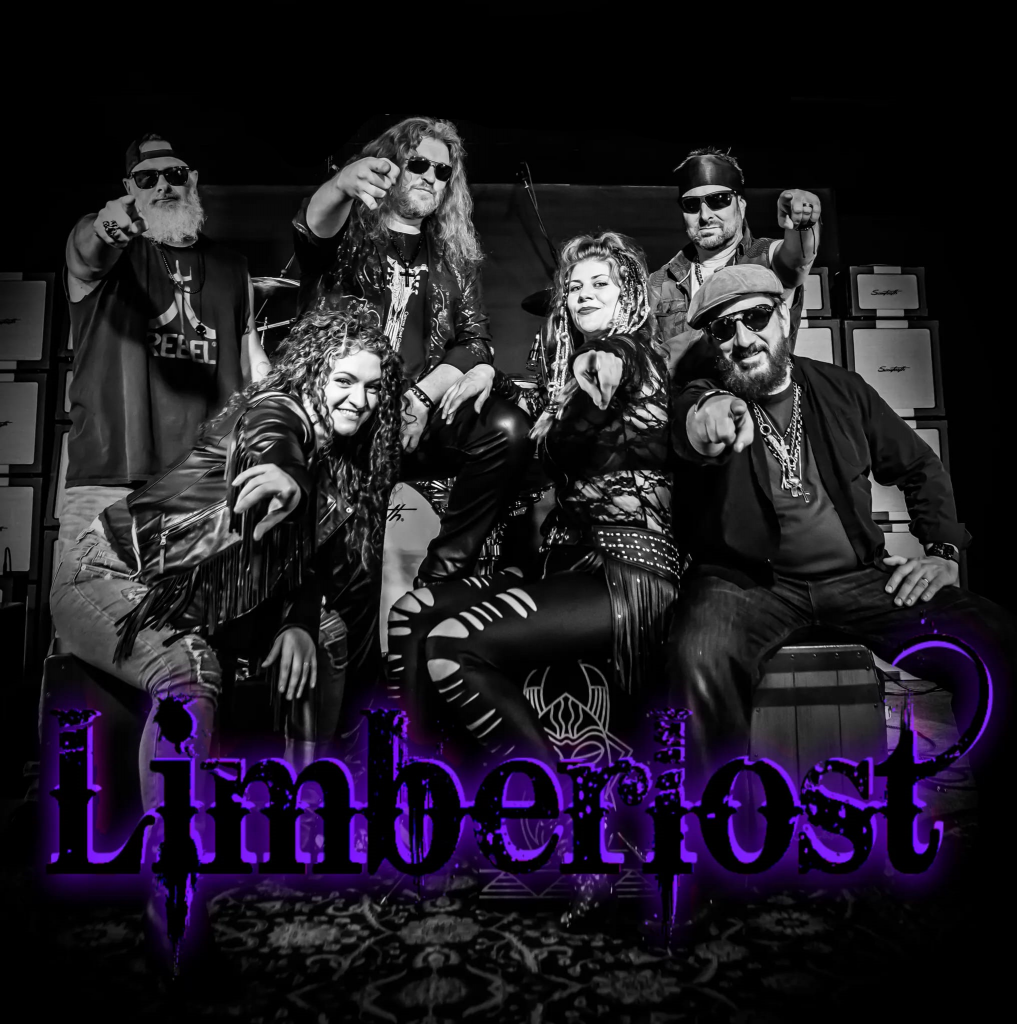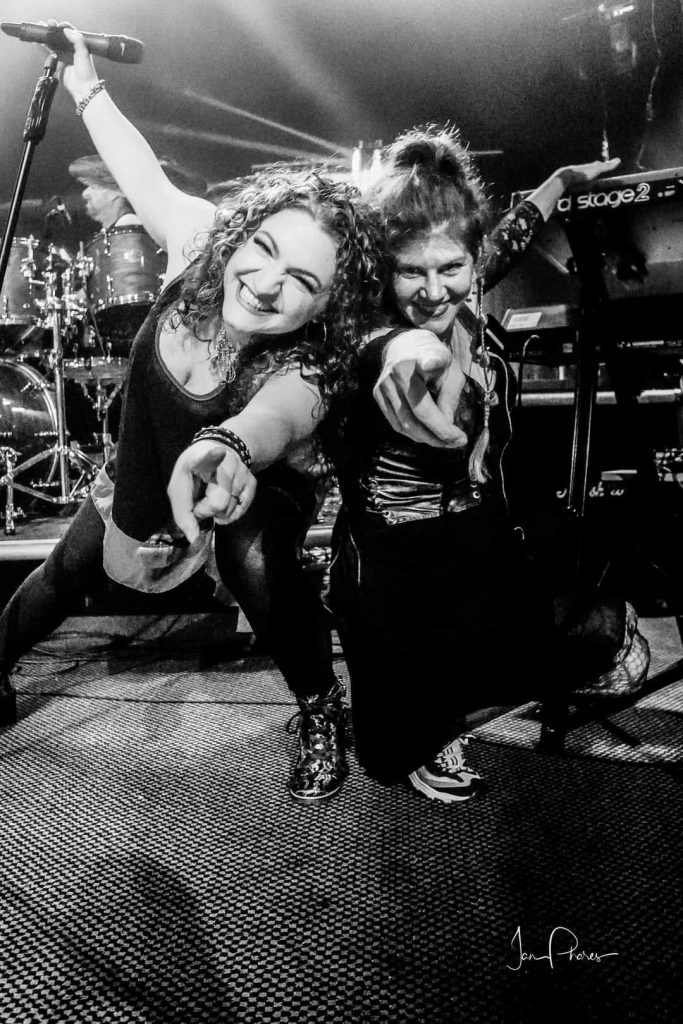Michael Burt and Limberlost were preserved by fate, it seems.
“One day, we decided to break the band up because it wasn’t doing anything — but we decided to record a couple songs before we did that,” recalls Burt. “We did and the engineer/producer Dave Smith started putting some of the songs out and there’s this big outcry ‘Who are these guys, let’s put them on the radio.’ We decided maybe we should be a band.”
The band started forming and went through several iterations. This present lineup came in late 2018 with Anthony (Ciarochi, keys) and Brittany (Lauren, vocals).
“That put a whole different swing on it because now we added two more songwriters to the group,” says Burt. “It’s been fun.”
ED Magazine caught up with Michael Burt (drums) and Brittany Lauren (vocals), courtesy of Bob Chiappardi at StripJointsMusic.com where they spoke about, among other things, expectations that come along with being a more ‘seasoned’ group of players and their new single “Black Velvet.”
ED: Can you talk about the challenges and benefits of having a six-piece band, how do you balance six egos/personalities/creatives?
BURT: We have several songwriters, so we also have several egos. It is a really interesting and tasty juggling act, because I don’t think we’d get the music we create if we don’t have that. If the tensions aren’t there — it’s hard to balance it, extremely hard but if everyone’s yoked up in it evenly and everyone wants the same goals, those projects fly pretty quickly. Fleetwood Mac is who we are most related to because of style since we have all that songwriting.
LAUREN: As well as personality in our band, we each bring our own personal taste and flavors to how we look, present ourselves. I think you see something really cool, and it works. Back to how do you make it work, sometimes you don’t. Sometimes you hear bands break up. There is an element of luck; we have made this brand and this work and these people work together for as long as we have. It’s always a transforming thing, it’s something we all have to work at inside of the realm of also being creative.
ED: Does being a band of more seasoned players make it easier to navigate the world of recording albums, promoting, playing shows, etc., or are there specific challenges because people’s expectations may be that a ‘new’ band skews younger?
LAUREN: When you get seasoned musicians, your assumption is they’re so good they walk in and sing the part, play the part, they do the part right. Yes, and seasoned musicians have a lot of influence and a lot of ideas they bring to the table. Seasoned musicians will also sometimes ride their talent a little bit. I don’t think anyone in our band is guilty of that, but certainly in my career that has been something that’s held up a studio session.
Sometimes, we like when Krystal goes in and does her one takes. I think “Black Velvet” was one or two takes — it’s when you get into that zone and you let everything go. Young musicians starting out are equally capable of entering that zone as seasoned musicians.
BURT: Krystal does that and to her own demise. Nothing frustrates her more than we go in and she does the scratch track and I come back ‘That’s it, we’re done.’ We just need you to sell us on the song and she does that so well, especially if she doesn’t think it’s real. At that point, we tend to overthink. It makes it really tough sometimes to do studio sessions because we have a wide variety of generations in our band. As our producer, Timothy Eaton, tells us ‘You’re like Noah’s Ark, you’ve got two of everything.’

ED: Female duo singers from Seattle will almost always evoke the legends that are the Wilson sisters (Ann and Nancy, Heart). Are Ann and Nancy inspirations for Krystle and Brittany? Is that an impossible standard to live up to, or is their legacy something that the band wants to use as inspiration?
LAUREN: Yes, to all of that. I grew up listening to Heart. My mother was a singer in the ‘80s, she sang in an ‘80s cover band in Arizona. She would do Heart covers, she sang “Barracuda” — I grew up with that music. We’ve had so many little, tiny connections. We got to sing their version of the “Battle of Evermore.” There was another time we got to rehearse in someone’s house that also was a setting for the Wilson sisters. So many people come up and ask us ‘Do this song’ or ‘Do you do any Heart?’
ED: Does having two singers create a unique sound for the band, and is that why you decided to feature two singers rather than just one?
BURT: Krystal’s got a very unique voice. That’s something I recognized early on, her tone and the way she delivers. She’s a powerhouse. Probably the first two-thirds of our first album, she did her own doubling and stuff like that. Then we ran into a situation where we were in a battle of the bands thing and we had an opportunity for a friend of ours had a singer in town and asked if she could join us for a song. We decided why not join us for the whole set, so she learned the whole set. What it did was expanded what we could do, not only material-wise but what we could write. But it still wasn’t at its potential until Britney came along. Britney is a powerhouse in her own right. In terms of what this girl’s background is, she’s toured Europe as an opera singer. She teaches music. Music is her life. She has the tapestry to what Krystal brings.

ED: Seattle has a legendary music history, but that history stretches back over 30 years to the grunge era. What is the scene like in Seattle today, and do echoes of that era still exist? Did any of the members of the band have a part in that era of music history?
BURT: Actually, no. Again, very multi-generational here. I was running around in 1980 in Spandex on the Sunset Strip. Our keyboard player, similar type of deal. We grew up in the ‘80s. I actually missed all that ‘90s stuff — I decided to have a child and be a career guy for 12 years. I came back into the industry in the early 2000s. Ricky (Dunn, guitar) is a transplant from Georgia, so he wasn’t there during any of that. Brittany is from Arizona, Tony’s from Alaska originally. Krystal’s been there her whole life, she would tell you most of her influences came probably from the earlier rock and pop days because her father was in a cover band, so that’s how she grew up. Ben (Beman, bass) is a transplant from Texas — I don’t even think he was playing guitar in the ‘90s or early 2000s. The Seattle scene is rich in history. The grunge era thing — I would say this, the immense amount of talent that came out during that time and the way it shaped the world of music, everything around here is hallowed ground. I would say, today, Seattle is still trying to find itself again. Like anything, there are people who hold onto the past thinking they’ll recreate it. You can’t, you gotta let it go and let it become new. I think the scene right now is trying to rediscover itself. We just did a couple of shows in LA this last year and it was cool to be back on the Strip. But there’s all that history, you don’t know what to expect. All you know is what has happened, not what’s going to happen. Seattle’s in that boat — there’s a lot of cool stuff up here that I hope pops.
“We have several songwriters, so we also have several egos. It is a really interesting and tasty juggling act, because I don’t think we’d get the music we create if we don’t have that. If the tensions aren’t there — it’s hard to balance it, extremely hard but if everyone’s yoked up in it evenly and everyone wants the same goals, those projects fly pretty quickly.” — Michael Burt
ED: What’s the most humbled you’ve been meeting a fellow musician — can you talk about how that interaction went?
LAUREN: I would say I got to live a bit of a full-circle moment in our last show in the sense I was one of those early 2000s kids that loved Creed. I never got to see them live, so we had this opportunity where we got to open for Scott Stapp of Creed and I gotta say, it was humbling for me. I got to from being backstage to a show I always wanted to go to. So much of my music is inspired by some of that music I listened to as a kid, so I really thought that was an amazing moment for me as a musician to be a part of this group that had this opportunity and I could bear witness to my own career path.
BURT: It was us, then Dorothy. That was a lot of fun. I would tell you, Daughtry had the lion’s share of that festival that night but when Dorothy went up there, ‘Oh my God.’
ED: What’s your best gentlemen’s club story?
BURT: I was just laughing at that because I don’t have many. Back when I was a kid, every 16-17-year-old kid, one of your conquests is sneaking into the strip club. There were these two gentlemen’s clubs in Modesto where I spent some of my high school years. We’d sneak out, go cruising and getting the beer. You get your fake ID, ‘I’m McLovin.’ I look like I’m 14, and they all know what you’re up to. We’d sneak in and sit there and stare like ‘Am I even supposed to be seeing this?’ My only adult experience with this, I was out with some friends — my wife and I — we’d done everything we were going to do that night so what should we do now? Let’s go to the strip club. My wife and buddy’s wife are more excited than we are. And watching them basically interview all the girls. They had an ATM that dispensed ones.
When you get seasoned musicians, your assumption is they’re so good they walk in and sing the part, play the part, they do the part right. Yes, and seasoned musicians have a lot of influence and a lot of ideas they bring to the table. Seasoned musicians will also sometimes ride their talent a little bit. I don’t think anyone in our band is guilty of that, but certainly in my career that has been something that’s held up a studio session. … Young musicians starting out are equally capable of entering that zone as seasoned musicians. — Brittany Lauren
ED: “Black Velvet,” the original (Alannah Myles) is one of the most sultry vocal performances of all time. Is this why Limberlost chose this song, as it’s a potential showcase for Krystle and Brittany? What else was it about this song that made the band want to choose it for a single?
BURT: We’ve actually been playing it live, a cover version of it, for about two years. I think Krystal brought it in.
LAUREN: It is sultry, it is challenging, it is fun, it is lovely, it’s showcasing — so yeah, Krystal brought it in years ago and we’ve been tinkering with it.
BURT: We know what we’ve got as a band, we know what we’ve got with these two girls. So if you’re going to cover something, you cover something that they can not only do well, but they can kill. There’s no point in doing it otherwise.
LAUREN: It’s hard to take something so well-known and so well performed. Alannah Myles killed that song. I’ve gone back and listened to it so many times, down to the tiniest details. You can’t make it better, but you can make it your own.
BURT: We had a cover version of it. I would say there’s certain elements within that cover version we were doing live that translated into this production. This production is not how we played it live before that. I had my epiphany moment with this song and this is the next single. I asked the band to let me produce it straight up; there’s so many great covers of this song out there. Go on YouTube and there’s not a cover of this song, with one or two exceptions, that doesn’t have more than a million views. It’s a song people love. But the one thing I did notice about every one of those covers was they all did it the way they did it. They all kept the groove the same. I chose to flip the groove on this and my goal was to carve it deeper into the landscape and make it a little heavier. I wanted there to be a difference — I wanted to own it.
LAUREN: The other thing to mention is we felt we needed a kick-ass video that shows what this band can do on-stage. When you go and look at all the videos, we’ve done some cool story videos, there’s a few performances, but they were showcase performances — not us getting dirty and showing what we can do. That video was missing. It’s a wave we can ride on — we didn’t want to copycat, we wanted to have our own expression. This is our chance to say and do what we want. We just absolutely love where this song has ended up.
ED: StripJoints services DJs at gentlemen’s clubs nationwide, so, in your words, why would “Black Velvet” be a good choice to play at a gentlemen’s club?
BURT: When I listen to this song and the way we presented it, it’s the grind to your bump. If you’ve ever wanted to dance to this kind of a groove, that’s what this song is about. What we gave this song was the ability for you to take a really cool, pretty song and make it nasty.
For more information, visit stripjointsmusic.com.






























